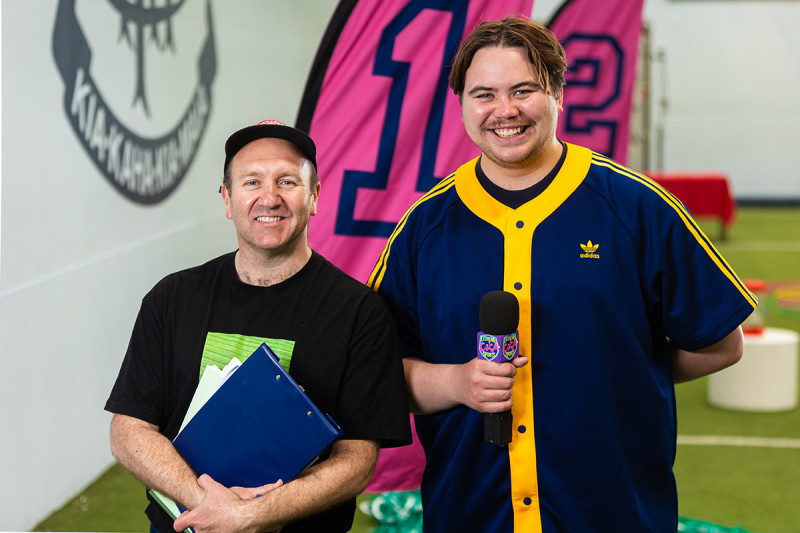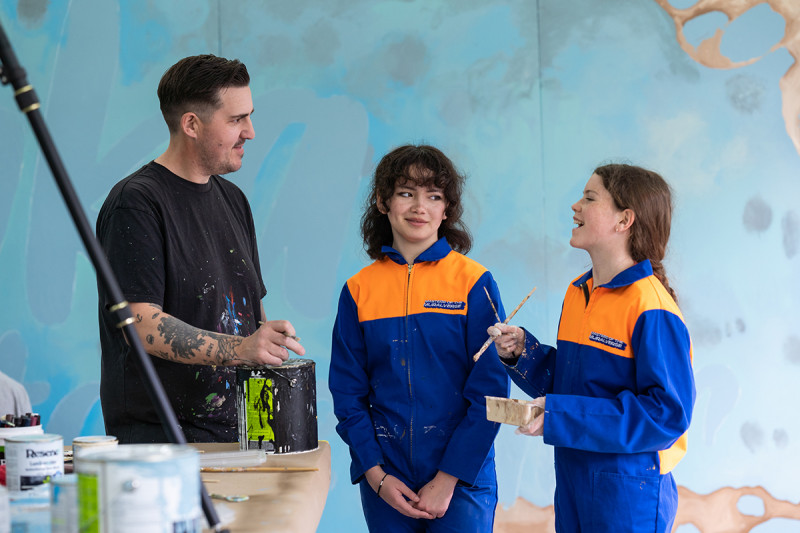
Bevin Linkhorn and Te Waiarangi Ratana

Masters of the Muralverse
Photo by Rebecca McMillan Photography
Wellington Silver Screeners: Bevin Linkhorn by Alessia Belsito-Riera
In our Wellington Silver Screeners series, Alessia Belsito-Riera shines a spotlight on the movers and shakers working in the film capital of New Zealand.
A writer, producer, and development executive, Wellington filmmaker Bevin Linkhorn of Good Times Company has learned to embrace the chaos and the unexpected – in both life and film. The creative force behind the TVNZ kids’ shows Extreme Cake Sports and Masters of the Muralverse, Bevin took part in the 2023 Unscripted: Screen Accelerator Project in an effort to take his competitive cake baking sports show to the international stage. Having caught the attention of an American producer, I saw the perfect opportunity to chat to him about his two-decade-plus career across the Wellington film industry.
How did you get started in the field?
I did a theatre and film degree at university as well as a commerce degree and geography. I just pursued things that I was interested in and really enjoyed theatre and film. From there I did a lot of theatre projects, so I got into the work via a bit of acting, but mainly writing. I really enjoyed the writing side, so I had a couple of plays commissioned by Young and Hungry Arts Trust at BATS Theatre that were for young audiences.
How did you transition into film?
I got an acting job on a TV show called The Tribe, which was made in Wellington. I then got a writing and directing job on an afterschool TVNZ2 show. It was an offshoot of What Now called WNTV. It was set behind the scenes at a TV station so we would write sketches to go between the cartoons. I did that for two years and it gave me a great understanding of TV production. I got a job working in development for a long time at a production company here in Wellington, where I learned how to pitch shows, come up with concepts, and address needs that the broadcasters or commissioners were looking for. Who’s the audience for this project? What is the research that needs to be done? I got to help script writers actualise their projects as well.
Do you still get to be creative as a producer?
I think sometimes people think producers are just the money people but actually, they’re the people that kick off a project. Even if that’s on the scripted side of things, that’s working with a writer – either falling in love with their idea or jamming ideas with them. So producers have to kick things off and corral a team. I would say producers have to be creative, because they have to make things on crazy little amounts of money and pull things out of the bag when things go wrong.
What drove you to start Good Times Company?
I was doing a bit of freelance work, and I realised I needed to have some kind of identity around the projects that I was doing. I threw that name on it through the enthusiasm of a colleague and friend to encompass the idea that we’re all meant to be having a good time. I try to make that flow through the team I’m working with as well. I think if you’re having a good time making it, that will seep through to the audience… otherwise the vibe gets killed.
For the last couple years, projects for young audiences have been a key focus. But I’ve also been chipping away on some other projects that are in the development stage for a different set of audiences.
What do you enjoy about children’s entertainment?
I’ve had a history of making content for young audiences. I really do enjoy it. I think it’s an important audience that deserves a diverse style of content. If kids can’t see themselves, they don’t get to reinforce what their identity is. It’s also just fun. It’s cool to work with participants who bring their own authentic selves to the show, not just actors.
Can you tell me about your show Extreme Cake Sports?
It’s a sports show that just happens to be about competitive cake baking. It’s got teams of 11 and 12-year-olds with two athletes and one baker, who is the captain. They compete through sporting activities for missing ingredients in order to make a cake. I came up with it with Sacha Cotter and Josh Morgan. We liked the idea of a baking show because young people want something they can control, and baking is something they can have an active hand in doing. Sport is a high-participation activity that young people like to do, so we thought to combine those worlds. As we make it, we always ask the question, ‘What would a sports show do?’ rather than, ‘What would a baking show do?’
I love that you combine two worlds that aren’t necessarily associated. It shows kids they can be many things at once.
When we first did the show, we recruited all these enthusiastic bakers from schools, but they had to pair themselves with athletes. We’re melding worlds to some extent. There are judges who evaluate the cake on appearance and taste too, and at the end everyone gets to eat cake!
What is it like to make unscripted content?
I’ve done both, but what I enjoy about the unscripted is that we provide the framework to do an activity, where we set up the rules of the show – how they earn the points, what the recipe is, what the missing ingredients are – but we don’t know what event is going to take place within that. I just have faith that something will go wrong and be challenging, and that’s the great thing you get to edit around to demonstrate how they solved the situation.
So you have to embrace the chaos and the unexpected.
Completely. And that’s where the fun comes from. It creates resilience. You’ve got to come up with a solution for the problem. It’s a low-stakes problem, but it’s a high-stakes frame. I enjoy seeing people figure out what to do in a situation, cooperation, empowerment, and giving them agency. And they still get to eat cake – maybe it’s got too much baking powder and there is no carrot in the carrot cake, but hey, it’s still cake!
How was your experience with Wellington’s Unscripted: Screen Accelerator Project?
Melissa Conway and Sean O’Donnell run this programme every year and I was keen to learn from Jon Kroll, an American producer based here in Wellington who was leading it. Jon’s got this amazing background of working on The Amazing Race and the original Big Brother. He has also pitched a lot, so he knows where the American market is looking – but he wants to make shows from here. So he has become this conduit for people who have done this course with him. At the end of the session we had to pitch our projects. I picked Extreme Cake Sports because it’s existing but only here so far. I pitched it as a slightly bigger concept that was more suited to co-viewing for parents and kids. There was a producer that Jon knows from the States who I have been having great active conversations with, so watch this space!
In the US, there are a lot more windows of pitching opportunities with different audience remits. It’s tricky here in New Zealand because there are only so many broadcasters and platforms. I would encourage people to go for the Screen Accelerator Project. There are good learning opportunities and connections and you might meet some other great creative people in the course.
What are you working on in 2024?
We’re setting up the second season of Extreme Cake Sports that will roll out on Sky, Radio New Zealand, and YouTube this year. I’ve got a few irons and fire, and that’s a part of this business – you’re keeping those embers burning as you push through.
What’s special about Wellington’s film industry?
I love living in Wellington. Sometimes you get the pull of wanting to move to Auckland because that’s where the decision makers, broadcasters, and commissioners are based, but I think it’s easier to get things underway in Wellington. I’ve also had a lot of great support from Gary [Watkins] and the team at Avalon Studios. They have helped out so many productions. There are also amazing film crews that work on the big, massive shows in Wellington. The benefit of that is when those big shows aren’t happening, they are available to work on the smaller ones, and they pull the skills they’ve learned and use them on the local stories. I think it’s nice to be able to harness those abilities. When they’re not available, other people get the opportunities to jump in, which is really important. It’s like an ecosystem.
What advice would you give someone who’s trying to get into the industry?
Be curious and ask questions. Figure out how you can be helpful. If you’re talking to producers, pitch a project to them. If a producer is interested, they’ll pick it up and then you’ll get a job through that, so practise pitching stuff to people.
View more articles from:
« Issue 217, April 9, 2024

